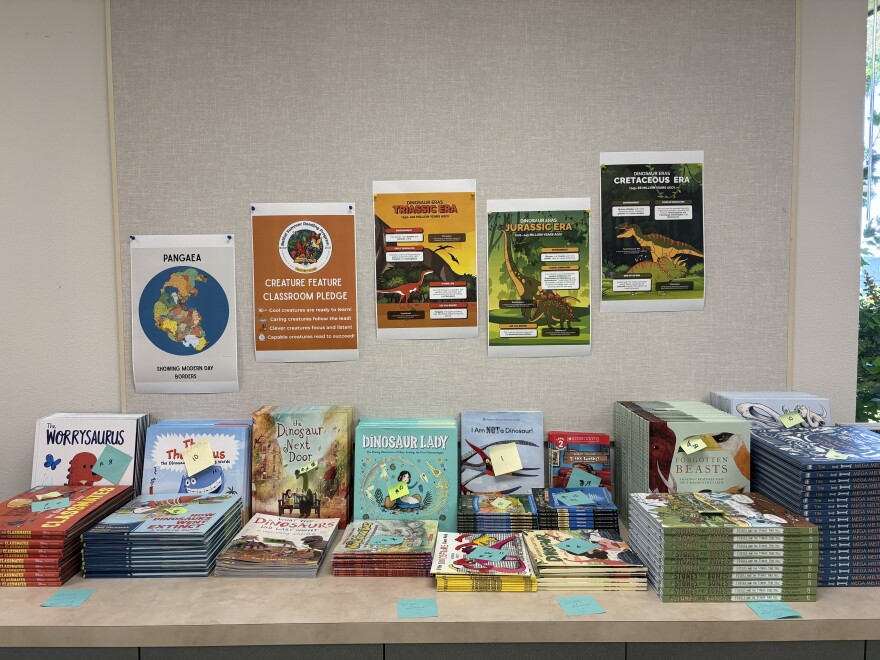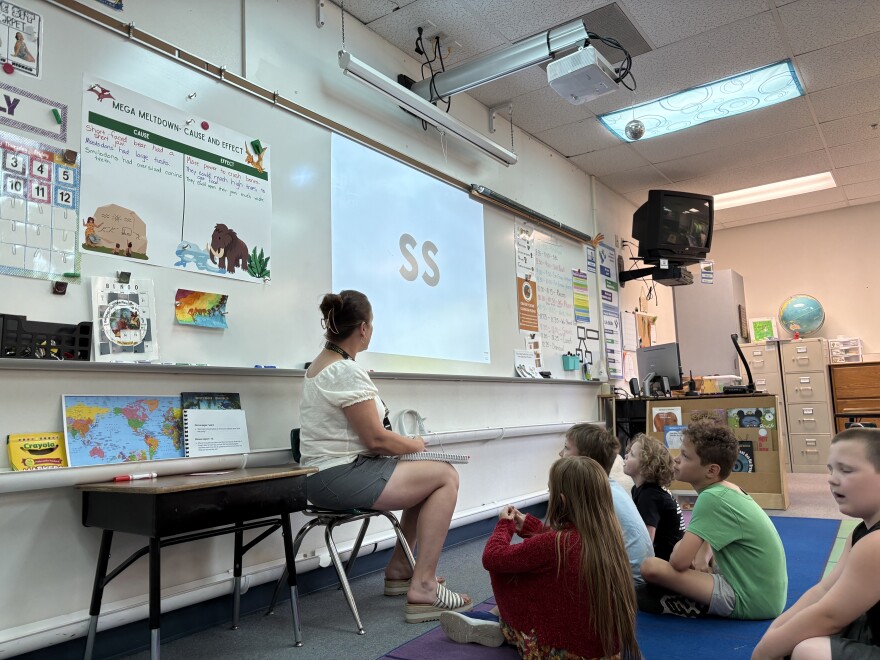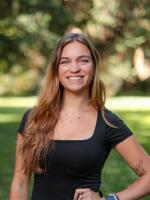At Prairie Mountain School in West Eugene, students are filing in from recess. It may be July, but school is still in session at the Bethel School District Summer Reading Program.
Today, first grade teacher Tami Wold is leading a phonics lesson, teaching students to recognize sounds from their spelling on a whiteboard and from the way she pronounces them.
“You’re going to blend the word as I say the sounds. Ready? Show your stuff, here we go,” she tells the class.
For seven weeks, staff and students sacrifice their summer mornings to come into class ready to engage in a research-backed reading curriculum.
“Everybody's here for the kids,” Wold said. “We're all willing to do what we need to do to make it a great time for them. And the kids love it. They come back; they come in smiling every day.”
In an adjacent building, fifth graders are reading in small groups. At a separate table, Andrew Buzella sits across from his teacher. He’s been struggling to differentiate between the letter “b” and the letter “d” lately, but he’s just finished reading three difficult sentences like a pro.
“He’s been sweating and I’ve been torturing him,” his teacher says playfully. “He’s working so hard.”
Brittanie Sorensen, the principal of the Summer Reading Program this year, looks on with tears in her eyes.
“I’m actually going to cry,” she says to Andrew. “I’m so proud of you. Okay, gotta shake it off.”
It’s moments like these, Sorensen said, that make all the hard work behind the scenes of the program worth it.
Oregon has some of the lowest literacy rates in the country, with 73% of fourth graders reading below the proficient level in 2024.
That same year, the Bethel School District created its Summer Reading Program for kindergarten through third grade students who needed extra help reading.
After the first year, one in four students invited to the program no longer needed intensive reading intervention.
This summer, the free program expanded to include fourth and fifth graders, hoping to continue and build on the accomplishments of the previous year.
Schooling support
Bethel’s Summer Reading program initially began because the district had additional Elementary and Secondary School Emergency Relief Funds from the COVID-19 pandemic.
After the success of the first year, the program received more state funding and grants to support its continuation and growth.
In April, Bethel staff and a student joined Gov. Tina Kotek as she signed a bill that will allocate $35 million a year toward summer learning. The district received $739,000 from the state grant this summer.
Other grants cover food and supply costs that help the program continue being free for families.
“Bethel is one of the districts to get the most money in the state, even proportionally to other larger districts,” said Alisha Dodds, director of community relations and communications at Bethel. “We have a history of having our summer reading program geared up and ready to go as soon as the funding hits. So they know that we're going to produce a really great program.”
The program is designed to help students retain and grow their literacy skills over the summer, a period that Sorensen said is crucial for students who need extra reading help.
“Our struggling readers tend to lose the most over summer, and then in the fall, it feels like we're starting back at square one because students have not retained the intervention services that they received prior,” she said. “But what we saw last year was, not only did students retain their skills over the summer, they grew.”
With funding secured for the next three years of the program, Sorensen said literacy coaches, like herself, have plenty of time to plan curriculums and lessons that promote student growth.

Reading is fun
The curriculum relies on a learning principle called the science of reading. It balances decoding and language comprehension for better reading.
Reading comprehension, Sorensen said, is crucial for all areas of education. The topics of the lessons aim to help kids learn other disciplines as they read.
“We really believe that literacy is the foundation and the key to every student's success. You need reading to be able to do advanced math, science and social studies,” she said. “What we've seen is, if students have the ability to read and understand what they're reading, they're able to make advancements in all areas of their learning.”
For younger students, the focus is on sound and word recognition, like the exercises in Wold’s class. Then, they grow into small group reading and vocabulary practice.
The theme of this summer’s program is prehistoric, extraordinary and mythical creatures. Keeping the lessons comprehensive keeps students interested.
Debbi Holte is a literacy coach and developed the program’s curriculum this year. She and her fellow coaches spent days researching educational principles and picking out books that best fit the curriculum.
“They're really thoughtful, specific and meaningful,” she said, pointing to a pile of books about dinosaurs. “And we really were explicit about the relevance, like, why is it important for you to be learning this? So, the kids hear that at the beginning and the end of every single lesson.”
After their first unit on prehistoric creatures, the kids aren’t just learning to read – they’re learning about paleontology, geography, and science.
Along with her peers, fourth grader Channa Inyang has enjoyed learning about animals from the past.
“I like (books about) dinosaurs because it goes into ancient times,” she said, “and I want to be a scientist when I’m older.”
First grader Oliver Farrell has also planned his future career around some of the things he’s learning this summer. If you ask him what his favorite dinosaur is, he’ll tell you it’s the Titanaboa, one of the longest snakes to ever exist.
“The size was six school buses,” Farrell said excitedly, before adding that he wants to be a snake expert, “like one of those people that have aquariums for snakes,” when he grows up.

Holte said students like Inyang and Farrell have applied the concepts and vocabulary from the program to their experiences outside of the classroom.
“When we're going to lunch or we're out at recess, the kids are using that vocabulary,” she said. “There were kids digging out in the sandbox the other day – we put fossils in the sandbox – and they were like, ‘I found a fossil. I'm a paleontologist.’ They were using all of that vocabulary in a way that was conversational and meaningful.”
Recently, the summer program students took a trip to the OMSI Jurassic World Exhibit, where they saw the creatures they’d learned about in Lego form.
“It was actually pretty fun. I loved it,” Farrell said. “I got to see the submarine; that was my favorite.”
For Sorensen and Holte, watching the kids engage with the lessons and activities they’ve worked months to plan has been the most rewarding part of the job.
With a few weeks left until the program is over, teachers are looking forward to sending their students back to school more prepared than ever.
“They're going back with the skills they need to better access their grade-level material. They're going back with more confidence. They're going back with excitement. They're going back with a whole other group of friends,” Holte said. “Even the fact that they recognize so many other teachers and educational assistants, that makes them feel like they belong.”
And, Holte added, it isn’t just the academic part that helps kids come back to the school year more excited to learn. When their classmates ask them what they did over the summer, they’ll have plenty of stories to tell.
“We've guaranteed that every single one of these 200-plus kids can say, ‘I dug for fossils. I went to OMSI. I went to the zoo.’ They have all of these things that they can talk about,” Holte said.
When the district releases data on the literacy rates of students after the program, it’ll be back to the drawing board for Sorensen and her staff. They’ll reevaluate the success of the program after its second year and make the necessary changes to improve student performance.
But they’ll also reflect on the differences made for students like Buzzella, Farrell and Inyang, who made big strides in their learning careers this summer, and have more success yet to come.




